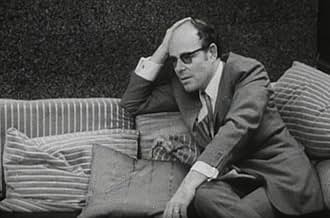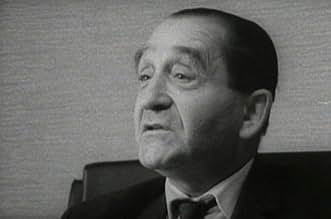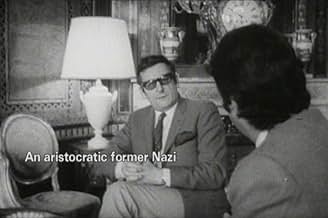Le chagrin et la pitié - chronique d'une ville française sous l'occupation
- 1969
- Tous publics
- 4h 11m
An in-depth exploration of the various reactions by the French people to the Vichy government's acceptance of the German invasion.An in-depth exploration of the various reactions by the French people to the Vichy government's acceptance of the German invasion.An in-depth exploration of the various reactions by the French people to the Vichy government's acceptance of the German invasion.
- Nominated for 1 Oscar
- 6 wins & 2 nominations total
- Self, former Wehrmacht Captain
- (as Helmuth Tausend)
- Self, general in the Wehrmacht
- (archive footage)
- (as General Stummel)
- Self, SS commander
- (archive footage)
- (as Zepp Dietrich)
- Self
- (archive footage)
- Self
- (archive footage)
- self, Former Mayor Of Combronde
- (as Monsieur Leiris)
- Self
- (archive footage)
- Director
- Writers
- All cast & crew
- Production, box office & more at IMDbPro
Featured reviews
The documentary selects a few dozen people to interview - virtually all with different roles and attitudes during the Occupation. I found particularly interesting:
the French doctor with "7.5 children" (?) who was concerned primarily with feeding his family throughout the Occupation and was thrilled when hunting began after a two year moratorium,
the champion bicyclist who began against great competition in 1943 because of the number of French riding bicycles due to the absence of gas to run their motorbikes or cars (and who said he didn't see many Germans around Clermont-Ferrand in Vichy France)
the extraordinarily gentlemanly and rather shy-seeming Resistance chief who refused to cooperate with the Communists in his ferocious anti-Nazi work,
the British transvestite singer who became a secret agent for the British in occupied France and broke up with his German soldier lover for fear of compromising him,
Anthony Eden's extraordinary tact and intelligence,
Pierre Mendes-France's wonderful restraint, objectivity, humor and
absence of recrimination,
the German father of the bride at a wedding reception whose attitude toward his (undoubtedly brave) service in the War is wholly uncolored by the fact that the country for which he fought was the aggressor, totalitarian, and vigorously persecutor of groups - (I actually suspect that if one were merely a soldier and had not personally acted dishonorably in the War, this is the attitude that most would have -whether a German or Russian soldier - despite extending one's own horrible system into the rest of Europe).
For one, such as myself, who does believe the Communist Party, especially in those days of Stalin, to have been as great a menace to the world as the Nazi Party, the documentary's failure to ever ask the Communist officials interviewed about their beliefs about substituting one horror for another is disappointing. I could not forget as I watched the interviews of Communists, the 14.5 million recently killed by the Russians in Ukraine as the result of the terror famine imposed on that region - or the Great Terror that killed more millions and concluded just as the War began. In fact, M. Ophuls discomfits the Resistance leader who defied Orders from the Free French in London to cooperate with the Communists against the Nazis - I felt like applauding his behavior!
I'm sure for most, the most fascinating character is M. de la Maziere, the extraordinarily candid, intelligent, disarming and charming aristocrat and former Fascist youth who, at the end of the War, volunteered to serve on the Eastern Front in the German Waffen S.S. - from which only 300 of the 5000 survived. He was quite remarkable to hear - he'd obviously spent a great deal of time thinking about what he had done, why, and although regretful, was unsparing in his description of what he knew and what he had done. However, in interviewing him in a German castle used between the Wars by the Kaiser, and in 1944 for Petain and Laval, the documentary makes it appear as if the castle somehow relates to de la Maziere - as if he owned it - when in fact Ophuls simply took him there for the interview. It's the one dishonest seeming moment in this wonderful documentary.
I strongly recommmend that others see it - you will wonder how you would react, and think about what those in your own country would react to foreign occupation.
Boy was I wrong. This turned out to be one of the most engrossing films I've seen. Yes, it is too long. But you're willing to forgive it that. This is simply the best film I've seen on World War II. Numerous interviews with French politicians, teachers, shop keepers, peasants, hoteliers, and more along with ones of Germans and Englishmen gave one of the most revealing and human portraits of World War II - and of the French people - I've seen. Combined with included archival footage from the war, this made for what is clearly one of the great all time documentaries and greatest WWII films I've seen.
TSATP draws you in right away and really never lets up. Almost every interview enlightens in some way. Everybody talking has their own agenda - spin in modern parlance - but the director is able to combine these in a way that exposes the most blantant of falsehoods and also paints a realistic composite portrait. The Nazi propaganda films were also chilling. One early example is a film of black and arabic French soldiers captured by the Nazis with the implication that racial impurity led to the French demise.
I could go on and on about this but I think I'm running out of room and need to talk about the DVD. I highly recommend this film for anyone who wants to go beyond history book versions of the war.
As for the DVD version itself, there are several flaws, starting with the $50 price tag. Beyond that, the print used was a poor one. The quality of the interview scenes was not much better than that of the archival footage spliced in. The subtitles were also not that great. Interestingly, much of disc two appeared to have a remixed soundtrack. For interviewees in English and German, the director dubbed over a partial French translation with the original language reduced in the background. This partial French translation was then subtitled in English (and not always well). On disc two, quite a few of the English sections did not have French dubbing or subtitles, which is where I suspect the sound remix comes in. The ending was also quite abrupt and choppy (Maurice Chevalier in English?) and didn't have the feel of being original, though let me stress I've no real knowledge to substantiate this.
Did you know
- TriviaOriginally intended for French television. However, French broadcasters refused to show it arguing the documentary depicted occupied France as exclusively populated by traitors.
- Quotes
Dr. Claude Levy: France is the only government in all Europe whose government collaborated. Others signed an armistice or surrendered, but France was the only country to have collaborated and voted laws which were even more racist than the Nuremberg laws, as the French racist criteria were even more demanding than the German racist criteria. It's not something to be proud of.
- ConnectionsFeatured in Annie Hall (1977)
- SoundtracksÇa Fait d'Excellents Français
Music by Georges Van Parys
Lyrics by Jean Boyer
Performed by Maurice Chevalier
- How long is The Sorrow and the Pity?Powered by Alexa
Details
- Release date
- Countries of origin
- Official site
- Language
- Also known as
- Le chagrin et la pitié
- Filming locations
- Clermont-Ferrand, Puy-de-Dôme, France(Main location)
- Production companies
- See more company credits at IMDbPro
Box office
- Gross US & Canada
- $13,082
- Opening weekend US & Canada
- $5,224
- Feb 26, 2023
- Gross worldwide
- $13,082
- Runtime
- 4h 11m(251 min)
- Color
- Sound mix



























